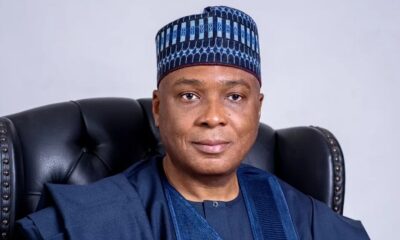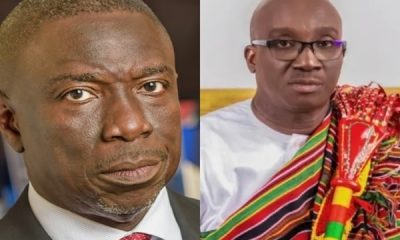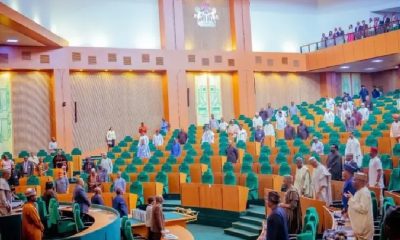News
Just in: CBN Imposes N100k Bar on PoS, Issues Warning to Operators

The Central Bank of Nigeria (CBN) has introduced a daily withdrawal bar of ₦100,000 for customers using point-of-sale (PoS) terminals, as part of a broader set of measures aimed at streamlining agent banking operations.
This new directive was communicated through a circular titled “Cash-out Limits for Agent Banking Transactions,” which was sent to all deposit money banks (DMBs), microfinance banks, mobile money operators, and super-agents across the country.
The CBN’s intervention seeks to address ongoing challenges in the agent banking sector, curb fraud, and establish consistent operational standards across the financial ecosystem.
The circular outlines specific guidelines for the implementation of these changes, which must be adhered to immediately:
Cash Withdrawal Limit: The withdrawal limit per customer is set at ₦500,000 per week, regardless of the channel used (such as PoS terminals or other platforms).
Daily Transaction Limit: PoS terminals are now required to impose a daily cash-out limit of ₦100,000 per customer.
Cumulative Agent Limit: The total daily cash withdrawal limit for each agent must not exceed ₦1,200,000.
Connection to PTSA: All agent terminals must be connected to a Payment Terminal Service Aggregator (PTSA).
Electronic Reporting: Agents are required to electronically report all daily transactions, including withdrawals, transaction limits, and balances in agent float accounts, to the Nigerian Interbank Settlement System (NIBSS) for onward transmission to the CBN. A template for this report will be provided to the principals of agent banks.
The CBN emphasized that principals (i.e., the financial institutions responsible for the agents) will be held fully accountable for any actions or failures related to the operation of agent banking services. This includes ensuring that all agents comply with the outlined limits and reporting requirements.
Furthermore, the apex bank warned that it would conduct unannounced checks, including back-end configuration inspections, to ensure that agents are adhering to these guidelines. The CBN also stated that any violations of the new directives would result in significant penalties, including financial and administrative sanctions.
This move is part of the CBN’s broader efforts to regulate the growing agent banking sector, enhance the security of transactions, and standardize banking practices across various service channels.
News
After NEC meeting, PDP will be born again– Bode George

Amid rising concerns over the mass defections from the Peoples Democratic Party, including high-profile exits in Delta State, party chieftain and Board of Trustees member Chief Bode George has expressed confidence that the PDP will recover and emerge stronger after its upcoming National Executive Committee meeting scheduled for May 15.
Speaking on Politics Today on Channels Television at the weekend George addressed concerns over the recent mass exodus of party members from Delta State, including former Governor Ifeanyi Okowa, and all 25 local government chairmen in the state.
Despite what some analysts have called a “tsunami,” George was adamant that the PDP remains resilient.
“A date has been fixed for our NEC meeting and after that meeting, you will see that this same Iroko tree, the political Iroko tree, will bounce back,” he said.
George described the Delta defections as “despicable” and “a lack of respect for a platform that honoured you.”
He expressed disappointment in what he sees as self-serving moves.
When pressed on the significance of high-profile defections such as that of Okowa, who was the party’s vice-presidential candidate in the last general election, George was dismissive.
“It is an experience. We have gone through this before. It is not a threat. Because something happened doesn’t mean it is fixated or it is finality,” he assured.
George argued that the All Progressives Congress, despite benefiting from the defections, offers no real alternative.
“There is hunger in the land. There is anger in the land. What do you think they are going to do there? If it is not a personal embellishment, what are they going to do there?” he said.
He acknowledged that the exodus appears damaging but maintained that the party has experienced similar episodes in the past and has always recovered.
George also issued a warning about the consequences of electoral manipulation in the future, stating, “If we lose, we hands off. But if we win and you manipulate the results, you are looking for an unimaginable conflagration. And we cannot afford that.”
Despite internal fractures and public criticism, the BOT member insisted the PDP is not in its final days.
“We will come up with a suggested solution which will be unanimous. These challenges we are facing now will further strengthen us,” he concluded.
News
Fubara breaks silence on PDP defection rumours, says “I’m going no where’

Suspended Rivers State Governor, Siminalayi Fubara, has debunked alleged move to the All Progressives Congress (APC).
Speculation had been circulating online, claiming that Fubara, alongside Delta State Governor Sheriff Oborevwori and Akwa Ibom Governor Umo Eno, was plotting a defection to the APC as part of a strategic realignment ahead of the 2027 elections.
The rumours intensified following the defection of Governor Oborevwori to the APC on Wednesday, along with his deputy, former governor Ifeanyi Okowa, commissioners, and key PDP figures in Delta State.
However, in response, Jerry Omatsogunwa, Fubara’s Special Assistant on Electronic Media, told DAILY POST on Thursday, April 24, 2025, that the governor remains firmly in the Peoples Democratic Party (PDP).
Omatsogunwa stated that the governor is likely unaware of the defection rumours and had made no statement or indication of plans to leave the PDP.
“I doubt if the governor is even aware of the alleged defection plans. As things stand, we are still members of the PDP, and nothing has changed,” he said.
He further emphasized, “Governor Fubara is still a bonafide member of the PDP. In fact, he currently serves as the Deputy Chairman of the PDP Governors’ Forum. As of today, April 24, 2025, at 9:46 am, there has been no defection, and the governor remains loyal to the PDP.”
News
Defections: Teejay Yusuf traces genesis of PDP palaver, key issues affecting Nigeria’s largest opposition party

…insists the party will have a rebounce
…says the trouble of the party was self inflicted
… PDP cannot go into extinction
Hon Teejay Yusuf a three-term member of the House of Representatives, who represented Kabba-Bunu/Ijumu Federal Constituency of Kogi, , an activist lawmaker, former NANS National Executive, in a Channels tv program spoke extensively on the problems bedeviling the largest opposition party in Nigeria, the Peoples Democratic Party, PDP, excerpts.
Tell us what has changed in the taste of the PDP?
A lot. The most fundamental thing that has changed is in 2023 we deviated from our fundamental principles of zoning presidency. If you remember in 2014 the agitation was that Yaradua didn’t complete his term and Goodluck Jonathan has taken over and to them, to a lot of people he was eating into the term of the North. About five governors led by Atiku Abubakar walked out of a convention in Eagles Square, that was the beginning of PDP’s crisis.
So in 2019 most of them have returned back, Atiku, Tambuwal and what have you, in line with that principle the party zoned presidency to the North so as not to fall into what happened before, Atiku emerged.
2023 it is natural it should have gone to the South but because some clevages and interests who felt they had the capacity to sway it, they made sure, I was at the meeting, they made sure there was no zoning and I remember I was telling them, if you don’t zone we will regret this because today Nigerian politics cannot be separated from religion and ethnicity for now, we might get there later when those things take back sit but for now.
So the moment we got into that convention without clear cut direction, that’s why, if you remember very well, that in 2022 PDP Presidential Primary, you have array of candidates from South. But in 2019, you had only aspirants from the North. So, we got into that, and we found ourselves where we are now.
So what you are seeing is the fact that, after the election, those clevages and interests began to start regrouping for the next election. If you observe PDP governors have been coming together to hold meetings regularly, and what have you, but I can tell you, they are not funding the party.
They are only holding meeting. By implication, they feel that, a lot of people feel that, we will cook this soup, make this party relevant and what have you, somebody will come because of primary elections are done by delegates, and what have you. But because of the number of states in certain sections of the country, it is very easy for somebody to pick the ticket. So they now thought okay, 2015 to 2019, will work this party, this man came pick the ticket, in 2023. So, this is the first time in about 10 years of PDP in opposition, when governors are not actually funding the party.
So, PDP is going through one of the worst political journey of its life. And unfortunately, we are now going into self-inflicted issues again, secretary issue, no secretary. It is clear, secretary of the party is elected at the convention. If you want to remove him, wait for convention, or find the appropriate organ of the party to remove him. You don’t sit somewhere, and say you announce another person as secretary. Some people came with a clear position. We are still going, governors met, and said, we do not recognize him. So by implication, maybe what happened y in Delta, some of the governors consciously allowed this crisis to continue, to find a justifiable ground to move because any time I look at it, how could you now after Supreme Court judgment, you are not directing the National Working Committee of the party to ask the deputy secretary to act. I mean, do you think the other man will agree?
So by implication, you are extending the frontier of the crisis. And I tell people that if you have one year to major primaries, and you cannot put your act together, National Convention of PDP will be in October or November, so why changing the secretary now when you go to convention and elect a new one, you will do a new zoning. Why don’t you just wait? Their tenure will expire.
Q: I’m listening, but I’m still not getting the reason why a very important state like Delta State, because indeed, while the National PDP might be having its own challenges, the political party at the state level, which is usually led by the governor of a state, oftentimes seem to hold their ground pretty firmly. They have held it in opposition now since 2015 when they lost. So what precisely has now changed in the taste that is now seeing the defection of an important state like Delta State?
A state that produced the vice presidential candidates of the party in the last election, I think we should ask them because I assume naturally that the vice-presidential candidate of the party in the last election should be the father of the present leadership of the state in Delta. So by implication it shows that… I don’t want to go there, but the truth of the matter is that the man has been eyeing that vice presidential candidate in the PDP for some time and it is one of the reasons we have these challenges.
Q: Would you see this as an evolution, you’ve given the instance of Mallam Nasir El-Rufai but within the APC, someone will say he’s not exactly holding any political position. He’s not an appointee. He’s not an elected official at the moment. So there are questions as to why an elected official of the PDP, of a strong state like Delta State, would want to defect to the APC, especially a state that also produced a vice presidential candidate in the last election.
You know one thing about success and victory? It gives you this larger than life posture. APC was not existing before and there was a time that almost every governor moved to PDP. So one thing you must realize about life is that it’s in season. I keep telling you people, that’s why I don’t believe in jumping party because if people could stay back in opposition and build an APC and we are just out for nine, ten years.
You said a party in extinction. If a party in extinction, that has member of National Assembly, that has senators, we have 13 governors who have won’t moved, let’s assume five moves. At the point, how many states you combine together ACN, APP, and what have you, APGA, all together you have about six of governors and you could still come together and form a party and you are talking about a party that has 12 governors.
As for taking the ticket, I don’t know. But I will not support him. And I agree, I will not sit here…
Q: I was asking him if the APC was responsible for your woes. You agree that partly that they are…
No.
Q: They are not?
It is self inflicted.
Q: You don’t blame them at all?
I gave you a background of 2014 to 2019 and 2023. So we chose not to see that those steps we were taking will lead to crises that will go beyond those periods. Don’t forget after the convention, our national chairman went to one of the aspirants house and said you are the hero of the convention. Is that how to heal? So there are consequences for action. When you do things, there are consequences. I don’t blame the APC because if I’m in their shoes, wouldn’t I want to have those men on my side?
Q: Are you disappointed though?
I’m very, very disappointed because we saw these things coming and we are still pushing. That’s why I told you. Look at the meetings that governors are holding. Look at things like that. When did the governors have such power to be telling National Working Committee, the Constitution of the party does not recognize Governors Forum that you now meet and give instruction on what to be done.
So the moment you go into those things, you are opening doors for crises that you cannot because one thing about crises is that you know how it starts, you do not know how it ends. So it’s for people to realize that, hey, this party is bigger than me, suspend your ambition.
If I have my way, I’ll advice Atiku, leave PDP tickets, let it go to the south. Even if we don’t win the presidential election, we will have been seen as going back to our original position, I mean, modus operandi, where party positions are zoned. And so every part, because let’s look at the South South and the South East, who have been reasonably the bedrock of PDP, you just come and pick ticket. People will start losing hope because the desire of everybody is to get to the peak of their career. If they now realize that because of numbers that come from one section in primary elections, they cannot get the tickets, they get frustrated.
Q: Honourable, I mean, it’s been about six, seven years now since this issue began solidly. I mean, if you back up from 2019, you also said the crisis began some ten odd years ago. So given the progressive degradation so to speak, of the PDP, are you saying the PDP is dead or dying?
I answered that quite correctly. I told you, the PDP is not dead and PDP will survive this crisis, go and write it down. One of the things that is missing, major ingredient that is missing, not getting out, is for people to realize that we are on a journey that will end in two bad scenarios. So why don’t I just pause? But when you still feel that you are the all-in-all, no matter what happens, when you get the ticket and what have you, you are okay, you are not bothered of the consequence or the result of the ticket. So PDP will not die, we’ll survive it.
But we might not be able to make the kind of impact we desire to make now. And that’s why I keep telling people, when they say leave PDP, come and join. I say, where am I going? At a point, ACN had only Lagos. APGA had only, maybe Imo, APP had no stare CPC had how many states and together in 2014, they came together formed an APC, when they were challenging PDP, they were having about seven or eight governors until five governors of PDP joined them.
So I still believe that some of us will stay back and build this party. I’m going to tell you that those who are in PDP for ticket and ambition will not be with us before 2027, they will go and when they go…
Q: In a way, you have validated that same position because you said just now that five governors moved from one party at a time, another one is moving now and you couldn’t even tackle your co-panelists there, when they said that you may not have up to five governors going into the next election. So I ask again, given these facts, and the progression that you are also speaking to, isn’t it right or valid for anyone to say, maybe PDP is going extinct gradually, or killing itself from within?
And I’ve answered that again and again. When ACN had one governor, was ACN dead? When APGA had only one governor, was APGA dead? That’s what I’m trying to make you understand. That we are in bad shape, yes but to say PDP is dead, no.
I still talk about you not realizing or not being too conversant with history. All that you say is happening now had happened to the other parties before now. And for you to come and say PDP is dead because a governor has just left. For political, I mean, jabs and punches, it might be good, but I pray God spare our life, we will come back to it later in life, you will know.
For now, ideally, it should have been APC versus Nigerians in the next election because there must be a platform, because the constitution does not allow independent candidature, there must be a platform, structures are needed. The fact that you are popular is not enough for you to win elections, clevages must come together, that’s where PDP has failed so far because we have boggled the opportunity of having a solid ground
PDP: Unfortunately I disagree. I feel that it is a coming together of desperate political power mongers, who formed APC and unfortunately for a nation like ours where we are, people are interested in who is in power. And sincerely, I won’t sit here and pontify and make it look like PDP is far, far better. We have not been able to come as a people to form political party in the ideal sense, where principles and values are the guiding rule. What you have presently in Nigeria is about where do I go to get power? Which cleavage will project me to power? And that’s why you see those defections. Those defections are looking at their next election. How does it look? Can I align here?
-

 News5 hours ago
News5 hours agoAkpabio arrives Vatican ahead Pope’s funeral
-

 News21 hours ago
News21 hours ago2027: Pro-Fubara protesters want suspended Gov to run as Atiku’s VP(Video)
-

 News24 hours ago
News24 hours agoOborevwori /Okowa: PDP experiencing a rebirth and will soon bounce back-Saraki declares
-

 News15 hours ago
News15 hours agoRivers State is yet to fully stabilise– Ibas
-

 News22 hours ago
News22 hours agoFlights resume as NiMET unions suspend strike
-

 News22 hours ago
News22 hours agoEdo poll: How APC allegedly offered witnesses N30m bribe
-

 News18 hours ago
News18 hours agoOsun PDP Reps Dismiss Defection Claims, Pledge Support for Adeleke
-

 News22 hours ago
News22 hours agoOver 26,000 Lagos students failed 2024 WASSCE despite govt paying over N1.5bn WAEC fees


















